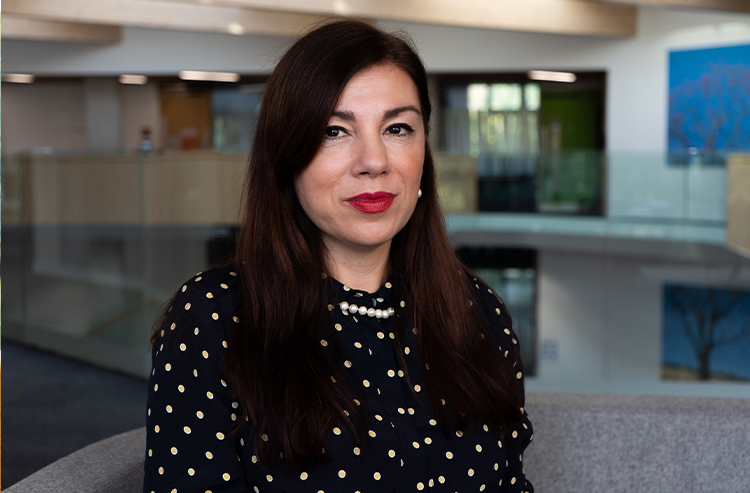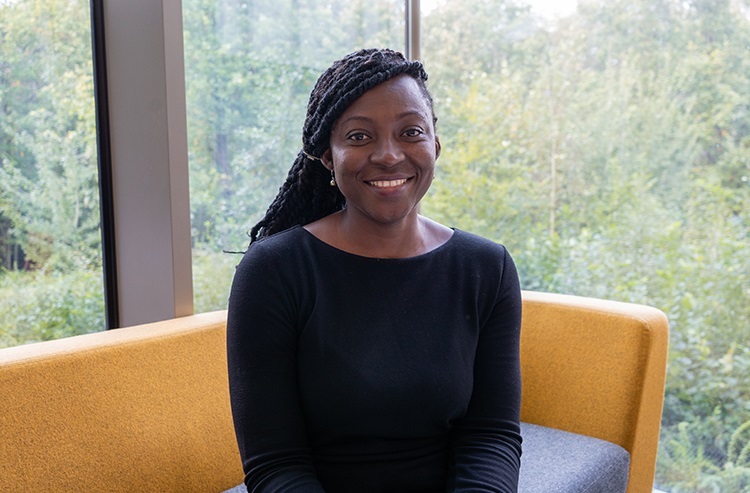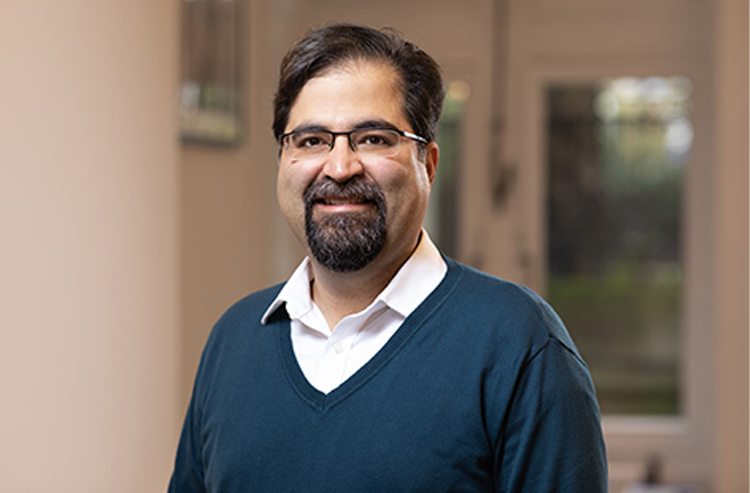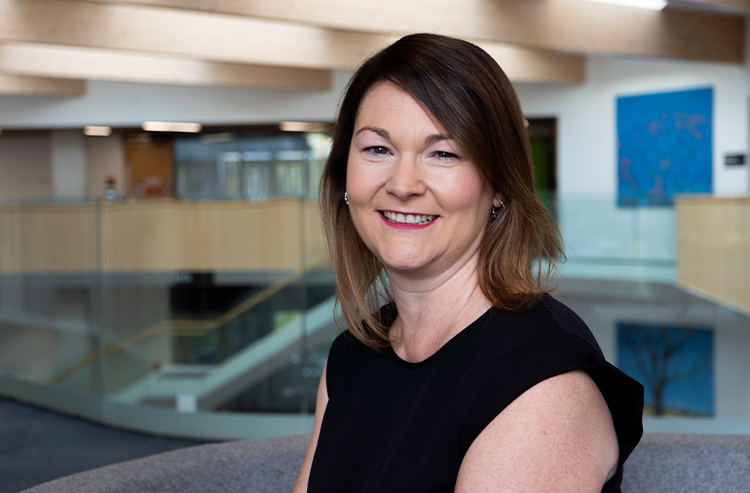Want to take a course taught by experts? Here at Kent Business School, our lecturers carry out vital and worthy research that feeds directly into the classes that they teach.
An impressive 80% of Kent Business School research is deemed ‘world leading’ or ‘internationally excellent’ in the most recent Research Excellence Framework and some of our academics feature in the top two per cent of researchers, globally.
Our academics influence strategies and practices worldwide and our research addresses some of the biggest challenges of our time such as sustainability and responsible leadership.
Here is an insight into just a handful of academic staff making waves in their chosen areas of expertise.
The STEM Trendsetter
Dr Kathy Kotiadis is Reader in Operational Research at Kent Business School. She is co-founder of PartiSim and has been commended officially for her work in STEM. An advocate for women in her industry, she is pushing for equality in the classically male-dominated field.
Dr Kotiadis is a celebrated expert in simulation modelling, something she has built while raising her two sons. She was recently commended by Taylor and Francis for her work, the accolade follows years of research and project work in the field which led to the development of a new modelling approach, PartiSim. The concept has been utilised by a number of organisations including the NHS.
She says: “Unlike traditional modelling, which usually involves a single stakeholder, the service offers direct input from several stakeholders at almost every stage of the decision-making process.”
Perhaps even more importantly, Dr Kotiadis is pioneering careers for women in her area after years of firefighting to succeed.
“The truth is women, particularly mothers, are not respected in this field. It is not equal. if I hadn’t had children my career path would be completely different. I was competing against colleagues that had stay-at-home wives who would iron their shirts and cook their dinners and it was a completely different situation for me juggling childcare and the pressures of motherhood.”
The picture is changing, says Dr Kotiadis, albeit more swiftly in some countries than others. The driver here, she says, is women coming together collaboratively and championing one another.
“I’ve been to conferences in the US where there are just two women in amongst hundreds of men. In the UK we’re moving towards more equality, but it is by no means completely fair and some of the old narratives remain about motherhood.
“As women, we are now better at supporting one another and we have networks to encourage women. I helped set up the WORAN network for this purpose. We are now more collaborative; we ensure we work together so that we get things done quickly and we can multitask our work with family life.”
Dr Kotiadis is heading up our most recent Knowledge Transfer Partnership with the Dover Harbour Board.
Dr Kathy Kotiadis is a Reader in Management Science/Operational Research at Kent Business School and is an expert in developing quantitative and qualitative modelling approaches to support stakeholder engagement, primarily in Health Care.
The Sustainable Accountant
Dr Abby Efua Hilson is a Senior Lecturer in Accounting at Kent Business School. Her research covers the accounting implications of the environmental and social impacts of various industries, including detailed projects on the oil and gas and mining industries in developing economies and work to support female gemstone miners in Africa.
“My dad was an Accountant. I loved numbers as a kid, he made them seem exciting,” explains Dr Hilson, who grew up in Ghana and later moved to Canada. “I went into finance and really wanted to break the mould by becoming an investment banker, then the 2008 crash happened and the sector just wasn’t the place to work at that time.
“Luckily, during my MBA education, I realised that accountancy and finance wasn’t all about big bank balances, but it could be used as a means for good. That’s when I decided to delve into academia, to research areas that might make a positive impact on society.
“I wanted to ensure that the companies coming into Ghana could do things differently and it started my drive to work on sustainable projects. I went to the oil communities to gather data on what was informing CSR reports of the companies. What I noticed was that the oil companies were recruiting people from Ghana’s mining industry to drive their CSR activities, that meant they were benchmarking against a sector notorious for failed CSR projects,” She explains.
“When I compared the companies’ published sustainability reports with my research findings, they were significantly different. My goal then was to increase awareness and say: ‘this is unacceptable, and something has got to change.
Now Dr Hilson is a Senior Lecturer in Accounting and Finance at Kent Business School, she makes it her mission to demonstrate to students that all businesses are consumers of the natural environment, and that consumption should be captured in the very same way that other values are noted and accounted.
She says: “The world is changing; we all have to think dynamically. You can’t just think about the numbers because behind the numbers there is an environment and a person. We may think that a lot of companies use their accounting processes wisely and that they will have disclosure reports on the environment, which they do, but they are not always what’s really happening on the ground.”
Dr Hilson also received funding from the British Academy in 2019 to go to Zambia and Ghana to engage with women who worked in gemstone mining and selling. Her aim was to help these women, often impoverished and living hand-to-mouth, to scale up their businesses but in a way that kept their actions environmentally friendly.
“These women are admirable; they are tough and capable, but they haven’t had the education and tools to scale up,” explains Dr Hilson. “I wanted to access their impact on the environment and then also introduce them to an accounting system for reporting their transactions.”
In her latest accolade to the net zero effort, Dr Hilson, alongside Kent Business School’s Dr Matteo Molinari, in response to the government’s call for evidence, investigated ‘natural capital’ in the UK, which looks at accounting for the economic health of a nation across all areas, not just GDP.
Dr Abby Efua Hilson is Senior Lecturer in Accounting at Kent Business School
The Fintech Expert
Dr Hirbod Assa is Senior Lecturer in Finance and Fintech at Kent Business School, his research covers fintech, insuretech, machine learning and risk management.
‘Most people are familiar with financial technology (or fintech) which is any technology that’s used to augment, streamline, digitise or disrupt traditional financial services, including software and algorithms.
‘Insuretech is a subset of this which refers to the use of technology to improve the efficiency of the insurance industry. It could be something as simple as enabling access to insurance documents via an app, or as complex as using algorithms to analyse customer data to inform more tailored insurance services.
My expertise is in machine learning and risk management as well as fintech and insuretech. I work with finance and insurance industries to use quantitative modelling to solve business problems and inform the creation of new products or services. I have worked with prestigious companies, including Lloyds bank and MUFG as well as smaller ones and start-ups which resulted in high investment outcomes.’
Hirbod Assa is Senior Lecturer in Finance and Fintech and Programme Director of MSc Financial Technology at Kent Business School.
The Equality Lead
Dr Samantha Evans is Senior Lecturer in Human Resource Management and heads up EDI at the Business School. Dr Samantha Evans is a lecturer in Human Resource Management and the Athena SWAN Lead at Kent Business School. Samantha’s current research interests are focused on social class inequalities and employee well-being, examining the impact of social class on individual experiences of work, work-life balance, equality and well-being.
Samantha’s research centres on a variety of important issues surrounding diversity and inclusion. Her recent research paper, A Bridge over Troubled Borders: Social Class and the Interplay between Work and Life’, was published by Work, Employment and Society.
It demonstrates that people who stay in the same social class as their childhood origins find the process of moving between work and home life reasonably effortless. However, those who are socially mobile find it far more challenging to move between home and work.
‘This research highlights the problem that inequality in the workplace based on social class is still very much felt,’ explained Dr Evans. ‘Participants of the study who felt affected by social mobility stressed that they felt like they were in different worlds and felt inadequate.
Employers seeking to improve social mobility and diversity in the workplace need to consider the work-life interplay of all staff, the problems that individuals may face and the support they may need.’
With a strong focus on women in the workplace, other areas of study for Dr Evans include the menopause in the workplace.
‘Despite the menopause being a natural part of ageing for women between 45 and 55 years of age, there is still much to be done to support menopausal women in the workplace – arguably one of the last taboos of gender inequality in the workplace.
Samantha is also passionate about women’s rights in the workplace – the pandemic shining a light on the imbalances between men and women when working at home.
She said: ‘Even prior to the Covid-19 pandemic, progress towards gender equality had been frustratingly slow and uneven. Yet here we are, at risk of ‘turning the clock back’ by overlooking the difficult labour market and caring inequalities currently faced by women.
‘Increasing evidence shows that women have shouldered the burden of childcare with the closure of schools and nurseries during the pandemic. Moreover, women work disproportionately in industries affected by Covid (such as retail and hospitality) during the pandemic.’
Dr Samantha Evans is a lecturer in Human Resource Management and the Athena SWAN Lead at Kent Business School. Samantha’s current research interests are focused on social class inequalities and employee well-being, examining the impact of social class on individual experiences of work, work-life balance, equality and well-being.





